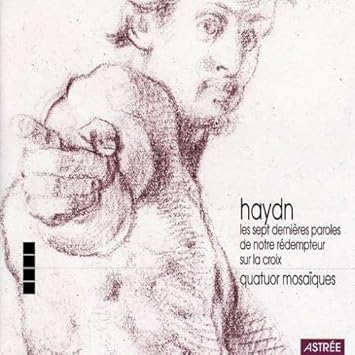|
| This is my post from this week's Tuesday Blog. |
I’ve not shared anything yet for the Lenten season. In past years, I have used this opportunity to program some organ selections, but opted out of that for 2018. Here is my only programmed share for Lent this year.
The Seven Last Words of Our Saviour on the Cross (German: Die sieben letzten Worte unseres Erlösers am Kreuze) was a commission made to Joseph Haydn in 1786 for the Good Friday service at Oratorio de la Santa Cueva (Holy Cave Oratory) in Cádiz, Spain. Published in 1787 and performed then in Paris, Berlin and Vienna. The composer adapted it in 1787 for string quartet and in 1796 as an oratorio (with both solo and choral vocal forces), and he approved a version for solo piano.
The seven main meditative sections—labelled "sonatas" and all slow—are framed by a slow Introduction and a fast "Earthquake" conclusion, for a total of nine movements.
The long-term popularity of Haydn’s The Seven Last Words among string quartets tends to mask the fact that it was originally an orchestral work designed for performance in a specific cathedral (Cadiz) in conjunction with biblical readings and priestly meditations. Perhaps the intimacy of the quartet genre has something to do with it (four players in seven prayerful Adagios).
In my personal collection, I have a pair of quartet interpretations – one by the Lindsay quartet (complete with the prologue and epilogue sections), and another by the Emerson quartet (limited to the seven sonatas). However, as I do in the Ciover 2 Cover series, I chose a version available on YouTube by the Mosaïques quartet.
Quatuor Mosaïques may be the finest period instrument string quartet in the world – high praise from AllMusic.com. No other group (not even the old Quartetto Esterházy) comes close to the deep, mellow tone of the Quatuor Mosaïques' individual instruments (Eric Hobarth and Andrea Bischof on violins, Anita Mitterer on viola, and Christophe Coin on cello, all period instruments), and no other group (not even the new Salomon String Quartet) approaches its rich, warm ensemble sound. Most importantly, no other period instrument quartet and very few modern instrument quartets can match the Quatuor Mosaïques level of musicianship.

Franz Joseph HAYDN (1732-1809)
Die sieben letzten Worte unseres Erlösers am Kreuze, Hob. XX:02 [op. 51]
Quatuor Mosaïques
Erich Höbarth & Andrea Bischof (Violin)
Anita Mitterer (Viola)
Christophe Coin (Cello)
Label: Naive Catalog #: 8803
IA Link - https://archive.org/details/SevenLastWordsOfChristOnTheC
Further listening – a YouTube playlist that includes all four versions of the work - https://www.youtube.com/playlist?lis...rqcMCVCH7q6I7_

No comments:
Post a Comment